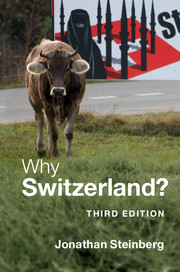Preface to the third edition
Published online by Cambridge University Press: 05 November 2015
Summary
That this book which first appeared in 1976 should still be in print delights but also challenges the author. Both the book and its author have grown much older and the world in which the 1995 edition appeared has changed beyond recognition. A small example will tell it all. In 1995 for the paragraph on strikes on page 2 of Chapter 1, I consulted a hardcover volume of the Statistisches Handbuch der Schweiz in the reference section of the University Library in Cambridge; it and countless other sources are now on line. The internet, globalisation, the ubiquitous smart phone, the huge explosion of wealth and the gap between rich and poor, the crises of the European Union, the problems of migrant labour and the emergence of religious fundamentalisms and terrorism, the relative decline of the United States and the emergence of the People's Republic of China as a world power have changed the environment in which a small, very special state, called Switzerland, now has to operate.
Much of what now goes on in our world cannot be observed by a single academic with an access to the internet, indeed, often not by the authorities of the great states themselves. Nobody knows, as I write, how the Federal Reserve Bank in the United States will dispose of the billions of securities it bought during the crises after 2008, and the same uncertainty afflicts the European Central Bank and the Bank of England. The Swiss National Bank has also had to act to counter currency swings as literally billions of dollars in foreign currency flow around the world at the click of a mouse.
As a result this third edition of Why Switzerland? makes more modest claims than its predecessors and will offer a much less comprehensive explanation of what is going on in Switzerland today. Its basic objective is to bring the data, where possible, up to date and see how much of the Swiss model, which I observed in the 1970s and 1990s still holds. If I can do that with some accuracy, I shall be more than satisfied.
I have added a new chapter called ‘Why Italian Switzerland?’ to answer the question how and why Italian Switzerland stayed Swiss when the border to the South separates two very similar Lombard communities.
- Type
- Chapter
- Information
- Why Switzerland? , pp. xiii - xviPublisher: Cambridge University PressPrint publication year: 2015



